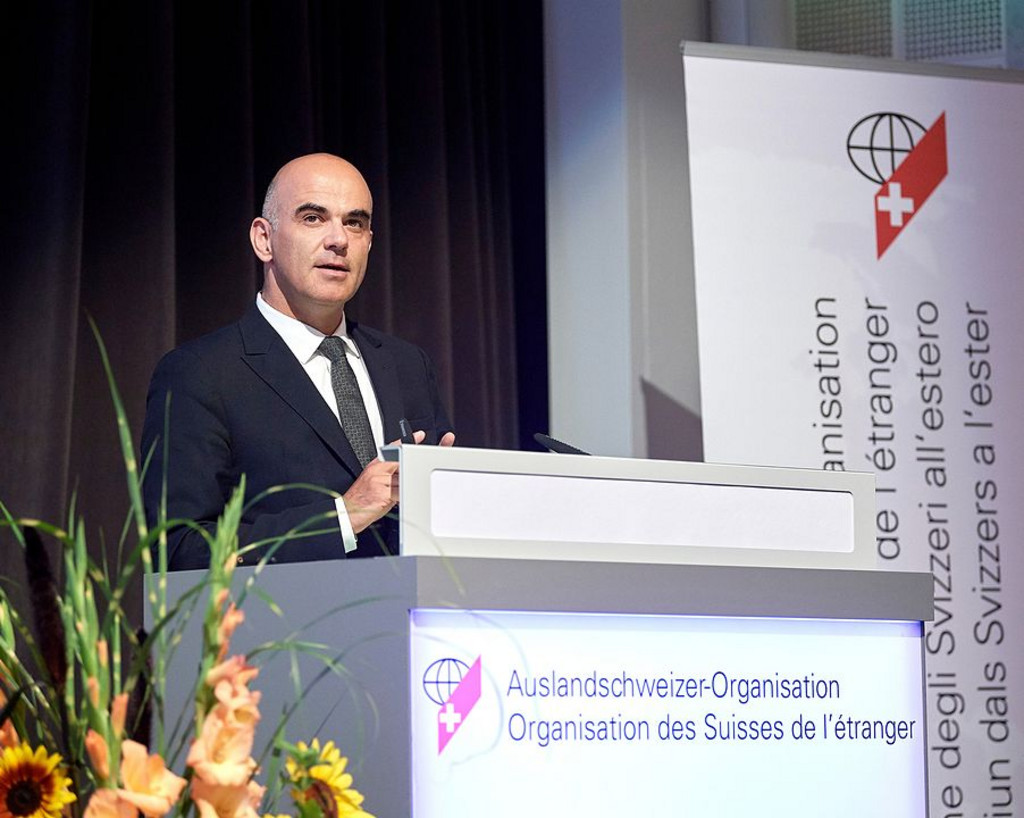Mr Gysin, no other issue is causing greater discontentment amongst the Swiss Abroad at present than the Swiss banks’ treatment of their customers in the diaspora. It is being made difficult, and sometimes impossible, for the Swiss Abroad to open bank accounts and some banks will no longer issue them with credit cards.
Yes, this situation is untenable. Long-standing customers abroad are having their accounts closed and relationships terminated by the banks. Almost all of the banks are demanding excessive charges from the Swiss Abroad which cannot be justified by administrative costs. They also want ridiculous minimum deposits to open accounts. The Zürcher Kantonalbank, for example, requires Swiss citizens abroad to deposit 100,000 Swiss francs.
What can the OSA do?
Our strategy is to seek direct dialogue with the banks. We have been drawing their attention to this issue for several years and our efforts are now beginning to pay off with some banks. For instance, the bank Cler has indicated that it will make its services available to Swiss Abroad in Europe. This is a first step. We are also increasing the pressure on the public banks – in other words, the systemically important banks with a public service mandate – as well as the cantonal banks.
Progress is also being made at parliamentary level. This gives reason for hope.
Most definitely. Roland Büchel and Filippo Lombardi, two National Councillors sitting on the OSA’s Executive Board, have submitted proposals on this issue. We are targeting the systemically important banks which should ensure that all Swiss citizens – including those abroad – can have an account. The proposals have contributed significantly to a rethink in Parliament. There has been a real new dawn over policy on the banks, especially in the National Council. A number of councillors who opposed these proposals in the spring have had a change of heart. The National Council recently submitted a motion to the Foreign Affairs Committee requiring Postfinance to treat Swiss citizens at home and abroad equally. This is encouraging.
Is absolute equal treatment of the Swiss Abroad by the banks realistic?
It is a vision that may never be entirely fulfilled. We nevertheless have specific demands. We want the authorisation of accounts for all Swiss citizens as well as reasonable fees and minimum deposits which do not disadvantage the Swiss Abroad.
Another real cause of concern for many Swiss Abroad is old-age pension. Lots of them have lived and worked abroad for many years, want to return to Switzerland after their retirement and suddenly find themselves faced with major issues due to contribution gaps and other unexpected hurdles.
That’s an important point. The OSA is therefore demanding facilitated access to voluntary AHV. We want to cut the five-year qualifying insurance period for people who temporarily move to an EU or EFTA member state so that they are not left in the mire when they return home. As far as AHV is concerned, we’re disappointed that the old-age pension reform bill was defeated on 24 September. It would also have benefited the Swiss Abroad.
Health insurance can also present problems for the Swiss Abroad.
Yes, we therefore advise all Swiss Abroad to sort out their health insurance before leaving Switzerland. Anyone moving to a country outside the EU or EFTA automatically loses the protection of basic insurance and is therefore dependent upon a private policy. This frequently causes problems. It is often complicated and expensive for the Swiss to take out health insurance policies abroad. What is more, in many cases they do not cover illnesses.
E-voting is also a perennial issue for the Swiss Abroad. What is the state of play with regard to electronic voting?
The OSA is actively campaigning for e-voting, and federal government aims to introduce it across the board as part of its digitalisation strategy. More and more cantons – most recently Fribourg – are introducing e-voting. However, it remains voluntary for the cantons at the moment. Politicians are slowly beginning to grasp this issue.
A final matter often mentioned in relation to the Swiss Abroad is mobility. How important is this to the Swiss Abroad? People are better connected and more mobile today than ever before. You can fly half way around the world for 100 Swiss francs. What are you campaigning for here?
Travel to and from Switzerland has increased amongst the Swiss Abroad. People move away, return to Switzerland and then depart again. In the past, people who emigrated generally did not return. The OSA’s task is to ensure there are no major upheavals with all of this mobility – whether in terms of political rights, bank accounts or insurance. Some administrative obstacles also currently restrict the mobility of Swiss people, ranging from the life certificate, which must be presented, to AHV where gaps suddenly appear. We want Swiss people to enjoy mobility without being restricted by such complications. After all, mobility means freedom.
95th Annual Congress in Basel
The newly elected Council of the Swiss Abroad met in Basel in August. Swiss people from all over the world also gathered for their Annual Congress. The event’s theme was “The Swiss at home and abroad – one world”.
116 members of the newly elected Council of the Swiss Abroad (CSA) met on 17 August in Basel for the first meeting of the new term of office. They elected National Councillors Laurent Wehrli (FDP/Vaud) and Claudio Zanetti (SVP/Zurich) as new Switzerland-based members of the Organisation of the Swiss Abroad’s (OSA) Executive Board and reappointed Remo Gysin as President.
The main issue discussed at Basel City Hall was discrimination against the Swiss Abroad by Swiss banks. At the end, Roland Büchel, OSA Executive Board member and SVP National Councillor, remarked: “We must keep up the pressure, including on the Federal Council.” Old age and survivors’ insurance (AHV) – the reform of which was to be put to referendum on 24 September – was also discussed. Delegates were keen to express their views on the “Old-Age Pension 2020” bill even though the issue was not on the agenda. They decided to support the reform bill by 80 votes to 22 with several abstentions.
The issue of pension reform was also addressed on the following day at the Annual Congress of the Swiss Abroad. Federal Councillor Alain Berset, who opened the speeches at the Basel Congress Center, said in his address: “This reform will secure our pensions, maintain pension levels and bring retirement provision into line with current requirements.” The bill was defeated at referendum a month later.
After the Federal Councillor, other speakers took to the podium to explore the theme of “The Swiss at home and abroad – one world”, including Thomas Milic from the Sotomo research institute. He analysed the voting patterns of the Swiss at home and abroad at elections and referendums and concluded that there were hardly any differences in general but there was disparity in specific individual cases. Compatriots abroad were less concerned about the refugee crisis than their fellow citizens in Switzerland but much more concerned over relations between Switzerland and Europe. As six out of ten Swiss Abroad live in Europe, this issue affects many of them directly.
After the speeches, the afternoon was rounded off by a podium discussion. Participants highlighted just how much the Swiss Abroad enrich Switzerland. Pascale Baeriswyl, State Secretary of the FDFA, explained that “the Swiss Abroad are to some extent our ambassadors abroad, for which we are truly grateful.”













Comments
Comments :
Verbrechen? Wohnsitz im Ausland!
Wie konnte es so weit kommen, dass man mit dem Wegzug aus der Schweiz automatisch als Steuerhinterzieher abgestempelt wird? Obwohl man beweisen kann, dass man alle Steuern bezahlt, kann man kein CH-Bankkonto mehr unterhalten? Warum darf man Menschen aufgrund ihres Wohnsitzes diskriminieren?
Ihre Bemühungen scheinen bei der Raiffeisenbank gar nicht zu fruchten. Mir wurde meine Konti gekündigt, inklusive alle Geschenksparkonti für Kinder mit Wohnsitz in der Schweiz, obwohl ich eine enge Beziehung zur Schweiz habe. Es sieht aus, als ob ich zukünftige Erbschafts-Immobilien gezwungenermassen verkaufen muss. Und meine Geschwister werden für meinen Wohnsitz mitbestraft. Ist das eine gerechte und faire Schweiz für alle ihre Staatsbürger?
Als ehemaliger Mitarbeiter habe ich nach wie vor Konti bei Postfinance, allerdings zu völlig überrissenen Kosten (CHF 25/Monat/Konto). Als Alternative empfehle ich gerne die Genfer Kantonalbank, die gerne Auslandschweizer und zu besseren Konditionen bedient! Übrigens ohne Minuszins.
Ich bin von der UBS nach 65 Jahren treuer Kundschaft blockiert worden, weil ich in Holland wohne. Nach vergeblichen Versuchen bei Kantonalbank, Raiffeisen und CS habe ich ein Konto eröffnen können bei Migrosbank. Es kostet 30 CHF pro Monat und die Karte muss zum ersten Mal aktiviert werden bei einer Migrosbank ATM.
I had no choice but to close it and move the funds offshore. I wasn't happy about it and the effort and paperwork involved wasn't that straightforward either.